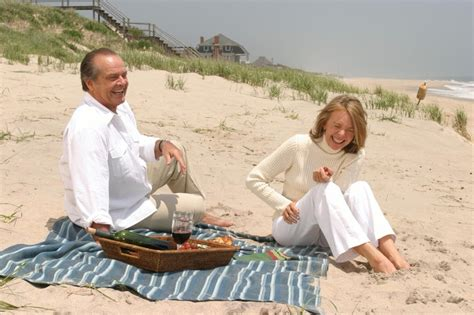For a long time, mainstream media portrayed older adults as asexual beings, perpetuating the myth that they are either uninterested in intimacy or should not be taken seriously when they do express their sexual needs. However, in recent years, I have noticed a shift in popular TV shows and movies, as they have slowly begun to normalize sexuality and aging.
Even though I can only speak about films and series I have personally seen, this is a fairly selective summary, but it still reflects a broader trend. The first time I noticed a more sex-positive approach to aging and sexuality was in the movie Something’s Gotta Give (2003). In the film, Diane Keaton and Jack Nicholson play two individuals who, after years of living separate lives, begin to explore love and intimacy later in life. Their characters, both over 50, are depicted with sexual chemistry and emotional depth, proving that desire doesn’t disappear with age.
Book Club (2018) and its sequel, Book Club: The Next Chapter (2023), take a more comedic approach to aging and sexuality but with an underlying seriousness about the importance of love and passion later in life. The films follow four lifelong friends who are inspired to re-enter the world of dating and romance. Though the main characters embrace their sexuality with humor, they also explore deeper themes, such as rekindling long-term relationships and navigating the dating world after years of being single. Even with their comedic tone, these movies reinforce the idea that sexuality doesn’t fade with age and that embracing one’s sexual self can be both rewarding and fulfilling.
The TV show Shrinking (2023) presents a more nuanced approach to older adults and sexuality. The show follows a grieving therapist and his older colleague as they navigate family life and romantic relationships. The older therapist, who has Parkinson’s disease, is portrayed as someone who actively explores his sexual life. By showing a sex-positive depiction of an older adult with a progressive neurological condition, the show reinforces the idea that intimacy can happen at any age, regardless of physical impairment.
While these films and shows often take a comedic tone, they address the serious issue of how we perceive aging, intimacy, and sexuality. They highlight that sexual desire doesn’t stop at a certain age and that relationships can continue to evolve as we grow older. They also explore the challenges older adults face—such as loss, self-doubt, or societal expectations—while celebrating the joy and fulfillment that come with finding love and connection, no matter one’s age.
These media portrayals matter because they shape public perceptions of aging and intimacy. When older adults are depicted as sexual beings, it helps normalize the idea that intimacy is a lifelong experience. It empowers older individuals to embrace their own desires and relationships without shame or fear of judgment. Most importantly, it reminds us all that sexuality is not something that disappears—it evolves, deepens, and transforms over time, remaining an integral part of the human experience.

